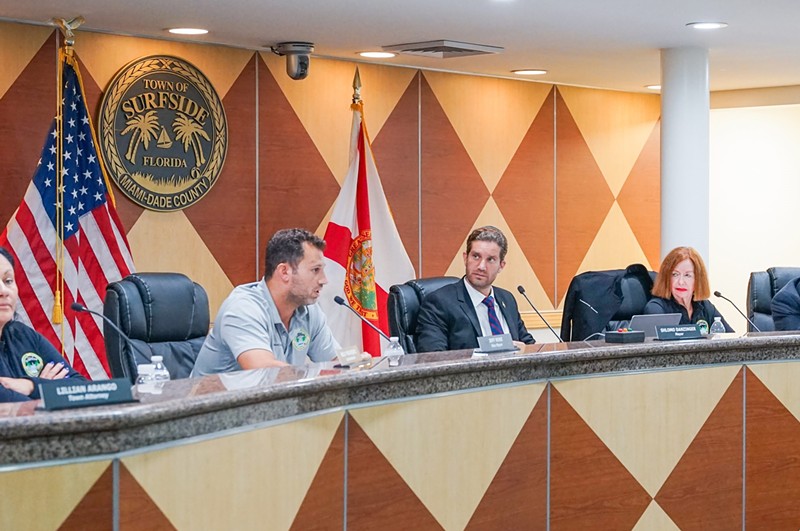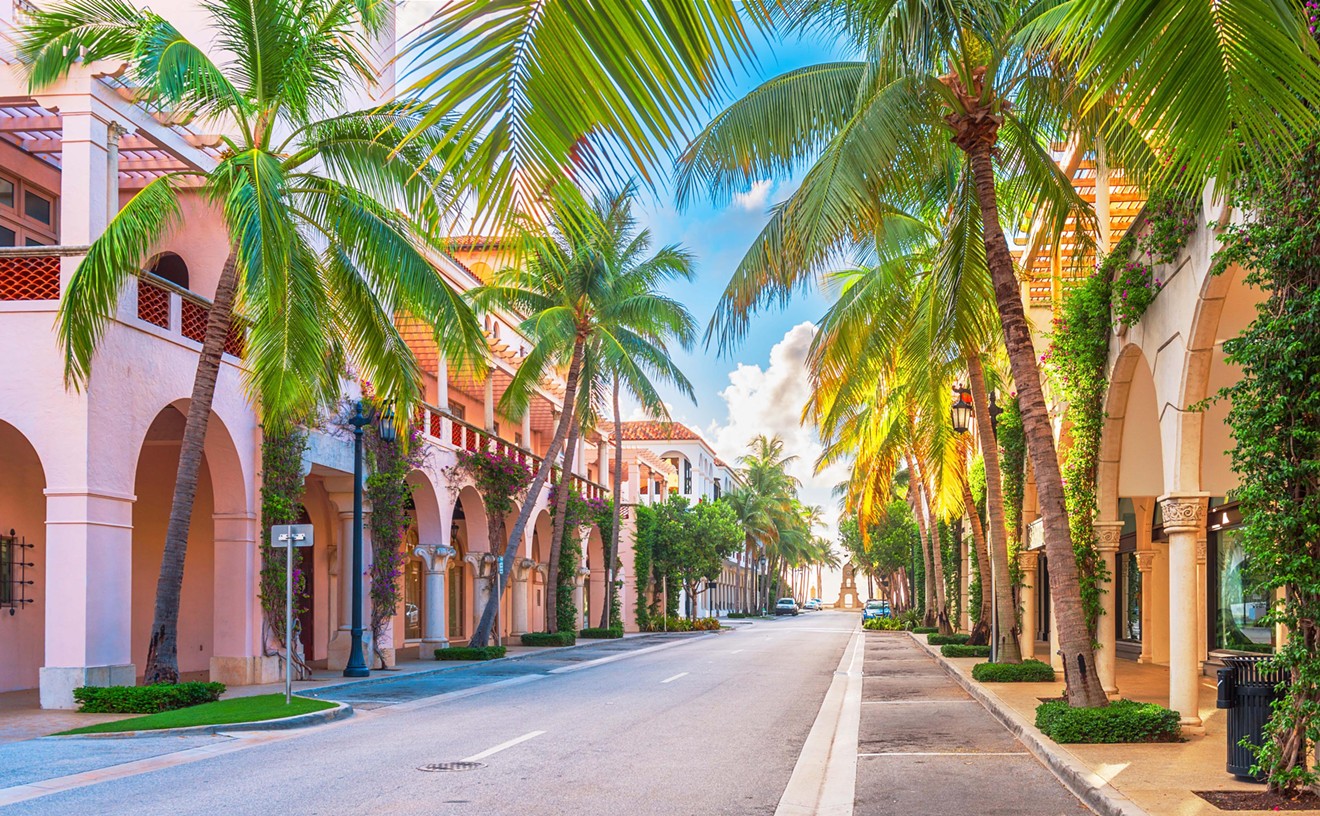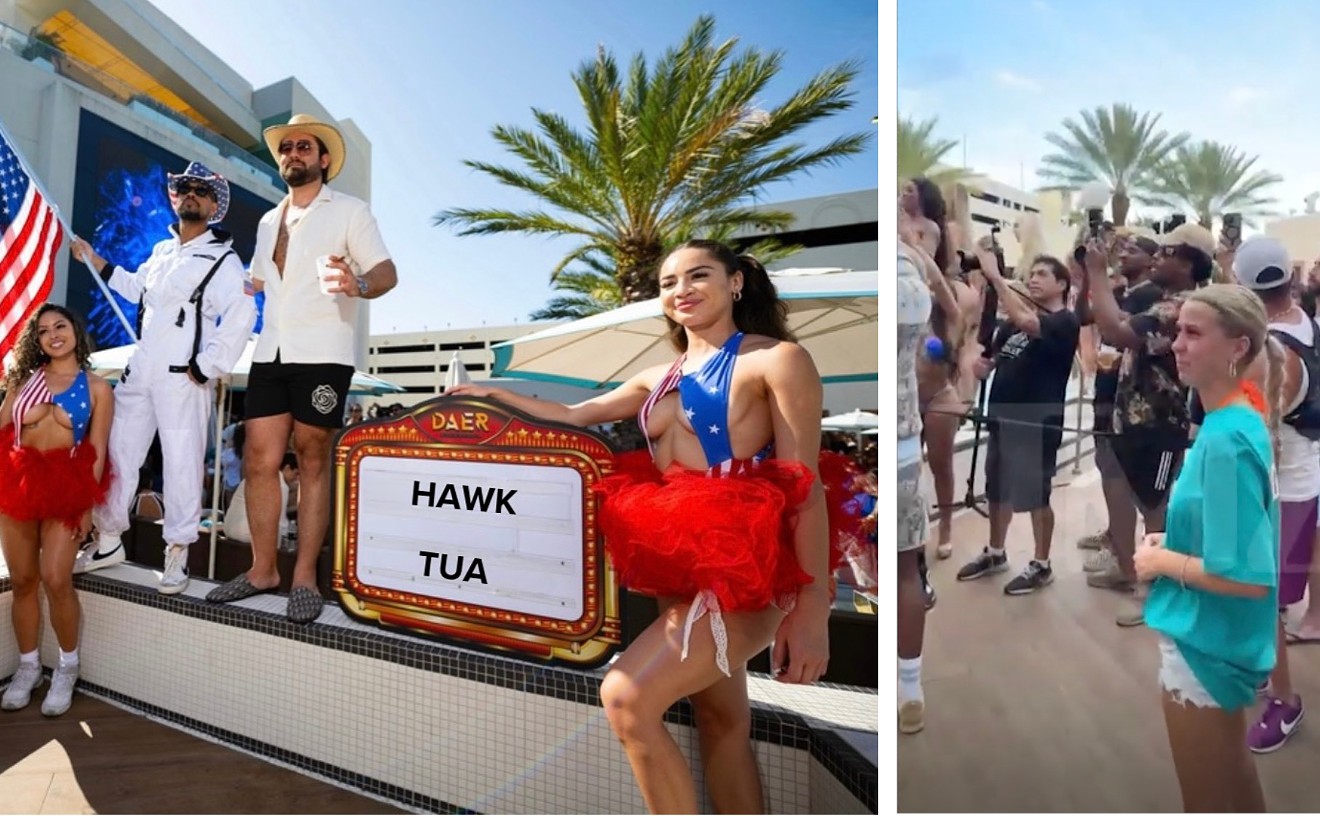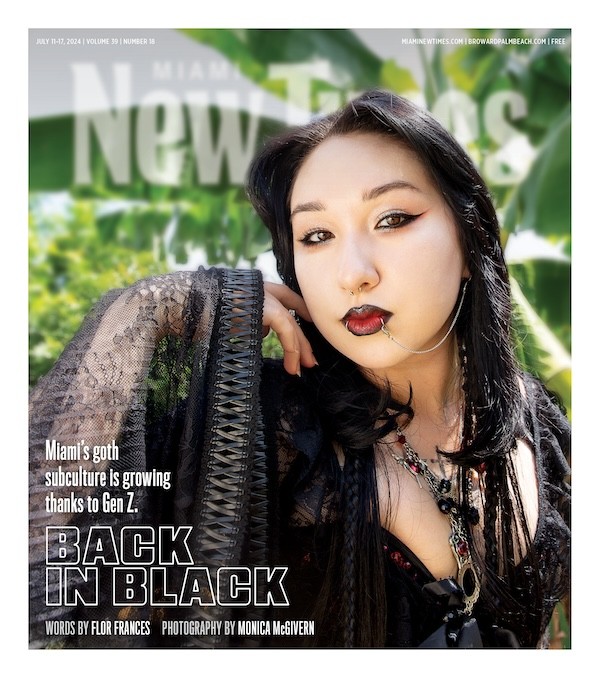In the midst of a tense municipal election last March, residents received a blitz of political mailers in support of re-electing then-mayor Shlomo Danzinger, then-vice mayor Jeff Rose, and other commission candidates. The ads came from an obscure political action committee: One Surfside.
Records obtained by New Times show that One Surfside was part of the political committee network to which Kushner and Fort Lauderdale development group Fort Partners contributed a combined $40,000. The contributions came in the midst of criticism from Surfside residents and activists who claimed town leaders were too cozy with developers and were poised to fast-track pending projects, including a buildout by Kushner Companies and others under development by Fort Partners.
One Surfside operates out of Plantation, roughly 25 miles away from Surfside, and is run by Florida political consultant Aaron Nevins, a public affairs manager who was thrust into the national spotlight years ago after collaborating with an alleged Russian hacker who sent him 2016 election data.
When reached by New Times, Nevins maintained all of the political committees were duly registered and that no improper campaign-financing activity took place. Upon being pressed about the source of the funds, he declined to comment on where the originating committee "Florida Way" – from which funds flowed to One Surfside – was registered.
By sifting through local records, however, New Times found that Florida Way was set up in Palm Beach County and funded by Kushner and Fort Partners. Described as a "local committee to support or oppose issues or candidates for muni[cipal] or county offices," Florida Way was formed in February 2023, with Nevins listed as its treasurer. Florida Way's funds flowed to a state-registered committee called Floridians Together for Change, which then contributed $20,000 to One Surfside – the entity that funded the political ads in favor of Danzinger and Rose.
It's not uncommon for developers to contribute to political action committees (PACs) advocating for their interests. Indeed, there was a lot at stake for Kushner and Fort Partners in the March municipal election. For instance, Danzinger's opponent, former mayor Charles Burkett, ran on a platform centered on scrutinizing new development in the town.
But the timing of the contributions and the manner in which the political committees were structured raise questions about funding transparency and the putative methods used by developers to hold sway in the small seaside town, which is steeped in conflict over a wave of residential developments in the wake of the tragic Champlain Towers South collapse.
Because Floridians Together for Change was a state political committee not required to report its financial disclosures until weeks after the election, the source of the political ads in favor of Danzinger and Rose remained unclear to voters at election time. Even after the committee's records became public, tracking the money would have been a tall task for your average resident unless they spent untold hours researching the committees.
The obfuscation of the funding – namely, voters' inability to see the funding sources until after the election – was facilitated by a 2023 Florida bill that loosened state political committees' filing requirements, allowing them to make financial disclosures on a quarterly basis outside of general election season. Previously, they had to file monthly.
Ben Wilcox, research director at government watchdog group Integrity Florida, says the change in the law opened up a "new loophole" that gives political committees another means of concealing donors in a funding environment already lacking transparency.
"Political committees can now apparently hide money because those filing deadlines have been turned into quarterly deadlines instead of monthly," Wilcox says.
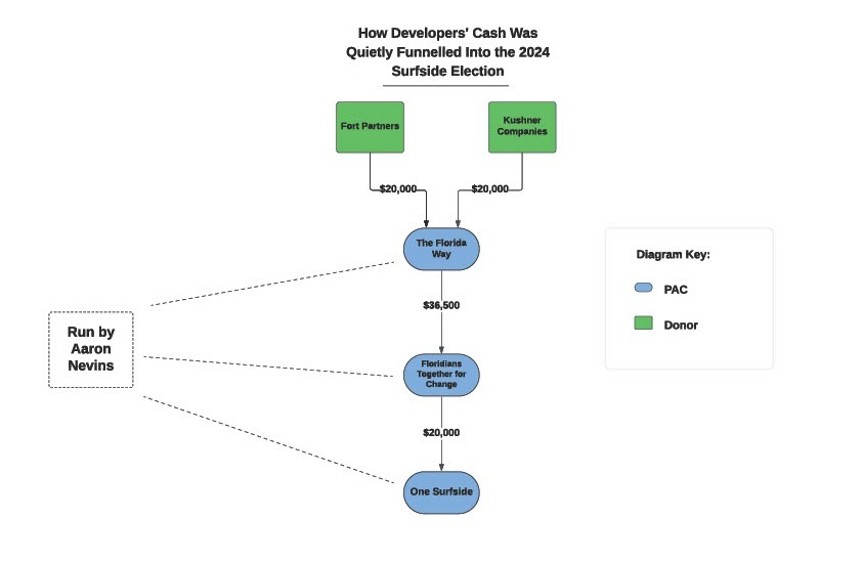
Funds flowed from Palm Beach County-based political committee Florida Way to state PAC Floridians Together for Change, and then to local committee One Surfside.
Image by Alex Deluca and Naomi Feinstein
Floridians Together for Change, which also lists Nevins as a registered agent, has the same Plantation address as Florida Way and One Surfside.
On January 24 – the same day it sent $20,000 to One Surfside – Floridians Together for Change contributed $5,000 to Danzinger's political committee, 1,000 Jews of Florida, a group that bills itself as a nonpartisan entity aiming to meet the needs of the Jewish community and engage Jewish voters.
"I must clarify that I am only familiar with 1,000 Jews of Florida," Danzinger says in an email in response to New Times' questions about the Nevins-run political committees.
"I wasn't privy to any financial matters, nor did I have access to the finances. My role primarily revolved around advocating for legislative initiatives and fostering relationships with supportive legislators," the former mayor says.
After months of political wrangling with opponents, raucous commission meetings, and a heated municipal race, Danzinger and Rose lost their bid for re-election in the town in March 2024. Burkett, who was mayor at the time of the Champlain Towers tragedy, reclaimed the mayorship from Danzinger, while local activist and photographer Tina Paul unseated Rose.
High-Stakes Development in Surfside
Kushner CompaniesCharles Kushner is a prominent real estate developer and former attorney whose real estate group, Kushner Companies, owns dozens of apartment buildings and commercial properties, in addition to a handful of hotels in New Jersey. He and his son Jared Kushner, former president Donald Trump's son-in-law, built a sprawling, multibillion-dollar real estate empire stretching from Texas to New York. Jared stepped down as CEO of Kushner Companies in 2017 after he was named senior advisor to then-president Trump.
In 2004, Charles Kushner pleaded guilty to counts of illegal campaign contributions, tax evasion, and witness tampering in a case stemming from false tax filings and Democratic political campaign contributions in the name of parties without their consent. He served 14 months in prison and was released in August 2006. Fourteen years later, Trump would grant him a pardon before leaving office in 2021.
Kushner has had a low profile in recent years, scarcely granting interviews and keeping his business and personal affairs private. In an early 2023 company letter, he was listed as Kushner Companies' chairman.
Kushner Companies' first Miami venture was announced in 2019: a $550 million project entailing the buildout of apartment towers on Biscayne Boulevard. The development group has since moved to establish a portfolio of high-end South Florida apartment properties.
In September 2023, Kushner Companies paid $40 million for a property at 9300 Collins Avenue in Surfside, with plans to develop an 87-unit residential building. At the time, Surfside's planning and zoning board appeared to have a glaring conflict of interest: one of its alternate members was Kushner Companies' head of Florida acquisitions, Michael Szafranski. Rose had appointed Szafranski in April 2022.
In November 2023, nine days before the Surfside planning and zoning board took the project's site plan under consideration, Szafranski stepped down from the board, noting that his "company has a pending project within the town's boundaries."
Prior to his role with the Kushner family real estate business, Szafranski was an investment advisor to Scott Rothstein — a former Fort Lauderdale lawyer who ran one of the largest investment frauds in Florida history. In 2015, Szafranski pleaded guilty to conspiracy to commit wire fraud and was sentenced to two and half years in prison for his role in the $1.2 billion Ponzi scheme.
After Szafranski stepped down, the Surfside planning and zoning board recommended approving the Kushner Companies' project plan at the November 2023 board meeting.
Months later, on January 9, 2024, Kushner Companies scored a major win after Danzinger and the Surfside commission approved its site plan for 9300 Collins Avenue. The commission approval came seven days after Charles Kushner's $20,000 contribution to Florida Way – a Palm Beach County political committee that was not designated as a Surfside political entity and, at the time, did not appear involved in advocacy in the town.
The January 9 commission decision granted religious land-use relief to the 9300 Collins site, which allowed the developer to bypass restrictions on building underground parking. Residents expressed concerns that Kushner Companies invoked the land-use relief so that the project would be classified as "mixed-use" and skirt the town's floodplain regulations and National Flood Insurance Program requirements.
Religious buildings are typically prohibited in the zoning area where the property sits.
"I really think this is being used in a very cynical way by this developer," resident Gerardo Vildostegui (who was later elected to a commission seat) said during the January meeting. "Laws like our RLUIPA and Florida's own Religious Freedom Restoration Act exist to protect the rights of sincerely practicing individuals. Kushner [Companies] is not having their freedom of religion burdened."
During the commission meeting, Graham Penn, a representative for the project, argued that the town's code and federal regulations allowed for religious land-use relief in instances where a town or city restricts religious assemblies more heavily than other assemblies. Because Surfside allows hotel banquet halls and ballrooms in the 9300 Collins zoning area, the project was entitled to build a synagogue, he argued.
The site plan was approved in a 3-2 vote by the Surfside commission. Danzinger, Rose, and then-commissioner Fred Landsman — all of whom the previously mentioned One Surfside ads and mailers later promoted — contributed the three yes-votes on the project.
A previous slate of commissioners had approved another developer's 205-room hotel plan for the site in 2019, though the project never came to fruition.
Fort Partners
Fort Partners has been one of Surfside's most prominent developers in recent years.
In addition to completing the Four Seasons in Surfside in 2017, Fort Partners has been redeveloping the historic Seaway Villas at 9149 Collins Avenue and the Surf Club Apartments property at 9133 Collins. In April, the outfit entered into a $60 million deal to buy the site of the now-demolished Surf House and a nearby lot.
With a handful of pending luxury projects in Surfside, Fort Partners' plans for the Surf Club Apartments redevelopment went before the town's planning and zoning board in November 2023 — a month after Florida Way received its $20,000 contribution from Fort Partners. It was the same meeting where Kushner Companies' Collins Avenue project plan was recommended for approval.
Fort Partners asked for site amendments that would reduce the project density from 29 to 24 units, remove the property's hotel classification, and increase the layout of the restaurant space. The amendment request sought to capitalize on a newly passed ordinance that allowed restaurants inside condos in the waterfront district of Surfside if they met certain conditions. (The ordinance, passed in June 2023, had been criticized by some residents as an unnecessary concession to developers.)
The zoning board ultimately approved Fort Partners' plan with staff recommendations by a 3-0 vote.
While both Fort Partners and Kushner Companies have initiated projects in Palm Beach County – Fort Partners purchased the Four Seasons Resort Palm Beach in 2014, and Kushner Companies had now-abandoned plans for a mixed-use apartment and retail project — it appears both companies have since turned their attention to Miami-Dade County.
Surfside Political Donations in Focus
In a town with a population of 5,500 and an area of less than 0.6 square miles, small contributions can go a long way, especially when multimillion-dollar developments are at stake. The ads in favor of Danzinger and Rose caught the attention of residents, notwithstanding the candidates' losing effort in the March 19 municipal race.The wave of mailers featured photos of the two candidates smiling wide as the mailers urged voters to "Re-elect Shlomo Danzinger." Printed in large font was the slogan: "Community leaders, working together for Surfside." One Surfside records show it paid out almost $15,000 to a series of vendors, including Nevins' company Chelsea Road, in connection with the political ads.
The loosened Florida regulations on state political committee filing requirements apparently enabled One Surfside's funding sources to remain hidden until April. Early in a calendar year, when many municipal elections are held, the statute no longer requires monthly filings — instead, state committees have to file ten days after the quarter ends.
In federal and state elections, dark money donations are rampant as PACs' donor sources are often concealed through nonprofit "social welfare" organizations. So-called "gray money" also creates barriers to transparency via the routing of political donations through multiple layers of political committees, making the task of tracking the money more difficult.
"The basic premise of campaign finance reform is who gave it and who got it. We've moved away from that. No longer is transparency possible. And now it seems we have a new way to hide money here in Florida, namely for local elections that are not on the same campaign cycle as the primary and general election," Wilcox of Integrity Florida says."The basic premise of campaign finance reform is who gave it and who got it. We've moved away from that."
tweet this
"Companies making large political donations are not doing it in the interest of good government. They're doing it hoping the government is going to be good to them," Wilcox says. "They're wanting to buy favorable regulations, and at the local level, developers are looking for favorable zoning regulations that allow them to do the projects they want to do. They're expecting something in return. But it's legalized."
The looser reporting requirements for state PACs were passed under SB 7050, signed into law by Gov. Ron DeSantis in May 2023, as part of legislative package with a wide range of election law changes, including controversial new restrictions on voter-registration groups.
The money trail to One Surfside played out as follows:
- In October 2023, Florida Way received its $20,000 contribution from Fort Partners. Three months later, in January 2024, Kushner made his $20,000 contribution to the committee.
- The Florida Way made three payments to Floridians Together for Change: $10,000 on January 3, $25,000 on January 19, and $1,500 on March 11. (These were the only large donations listed in public records for Floridians Together for Change.)
- On January 24, Floridians Together for Change sent its $20,000 contribution to One Surfside and its $5,000 payment to 1,000 Jews of Florida. Roughly $10,000 more was spent on unspecified phone calls, new voter canvassing, and general consulting fees.
While Danzinger's opponent Burkett claimed the then-mayor was "in the pocket" of developers, Danzinger called the accusations "humorous" coming from Burkett, who has made a living as a developer himself. Danzinger characterized his detractors as disruptive rabble-rousers who threw city meetings into disarray over unfounded allegations.
In the end, residents voted out the politicians who were criticized for voting in favor of Kushner Companies' project: Danzinger, Rose, and Landsman.
Regarding the network of PACs, Danzinger maintains that he was only involved in 1,000 Jews of Florida. "The objectives of the PAC resonated with my beliefs, and I was dedicated to furthering them through legislative means," Danzinger says.
After losing his mayoral seat to Burkett, Danzinger announced he is running in the upcoming Miami-Dade County mayoral election.

